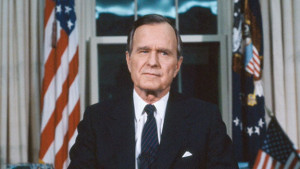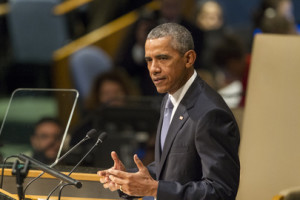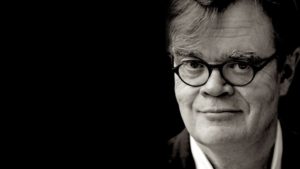Public radio storyteller Garrison Keillor signed off his last show over the July Fourth weekend, leaving behind an adoring audience which he chose not to challenge with “prophetic” critiques of America, writes Sam Husseini.
By Sam Husseini
On what was billed as his last show, Garrison Keillor, host of “A Prairie Home Companion,” got a call from President Barack Obama and they traded extensive compliments, with Keillor telling Obama he was “the coolest president.”
Keillor’s signing off on the July Fourth weekend was likely calculated to extenuate his presumed ties to all things Americana, but for me it actually highlighted his hypocrisies and contradictions.
For one, my favorite story of his was set on the Fourth, some 25 years ago. I’d long thought that any reasonable person who hears that story would concur it was his greatest. Unfortunately when I asked him about it last year, Keillor clearly wouldn’t fit it into that category. He largely disavowed it.
The story — which he told shortly after the 1991 Gulf War bombing of Iraq — was simply titled “Prophet.” It dealt with the pain of telling hard truths that many people don’t want to hear and was an implicit condemnation of America’s elaborate celebrations that followed the one-sided U.S.-led slaughter of tens of thousands of Iraqis, both soldiers and civilians, in the Gulf War. Keillor observed, “to rain down death on people and then to gloat over it is not becoming in God’s eyes.”
When I heard it at the time, it gave me a sense that there was a sliver of hope in turning the U.S. public around regarding the country’s place in the world. My girlfriend back then gave me the cassette tape collection that included the story as a birthday present.
I tolerated Keillor’s unevenness for years after that, listening on and off. I had an unsatisfying run-in with him in 1999, but I’d overlooked that and his various annoying proclivities, especially his seeming incessant avoidance of the moral sins that created the U.S. — because he told the “Prophet” story. But you never really know someone until you have a chance to ask them a couple of questions, as I did when he spoke at the National Press Club last year.
He began his talk at the Press Club by bemoaning that people rarely addressed particular things he’d written. They’d just say “good job” — as you “would say to a child who had had a bowel movement. … As I look back on my career in broadcasting, nobody had ever complimented me on a specific thing. Nobody had ever quoted back to me some brilliant thing I had ever said. It was always general. ‘We like your show.’ ‘It really relaxes our children.’ ‘We listen to it late at night.’ And it occurred to me that perhaps I had spent 40 years in radio as a sort of comforting baritone presence and that nobody heard anything in particular that I had said.”
Questioning Prophecy
I felt so good because I had submitted a question about the “Prophet” story, which he told decades earlier. Surely he’d be floored that someone remembers that story. Perhaps seeing that that’s what resonated with people he would be compelled to use his pulpit to do more of that caliber of commentary.
The moderator of the event, then Press Club President John Hughes did ask that question: “One of your greatest stories on ‘A Prairie Home Companion’ was the ‘Prophet’ which you told during the 1991 Gulf War. What would a prophet tell us now?”
But Keillor basically renounced the story: “I am not in the prophecy business and sort of regret that monologue. I’ve been trying to forget it for years and years. It was one of my ill-advised ventures into political commentary. I had almost erased it from my mind, John. You brought back a little tiny bit of it. That’s p-r-o-p-h-e-t? I have no idea — I have been around and seen a lot of young people in the last month …”
He yada-yada-ed for a bit about passing the mantel, but the point was made. [See video.]
Here’s the most substantial chunks of the “Prophet” story:
I recall when I was a little boy, going to the volunteer fire department Fourth of July picnic. My family doesn’t remember this at all, but they have very poor memories. … I got the beans on my plate and I had the bun and I had just put the wiener in the bun and I was just squeezing the ketchup and the air turned white and it was snowing. Snow was falling and everybody was amazed and then somebody said, “oh no”, they said, “It’s fluff from the cottonwood trees, it’s just seeds coming down from the cottonwood trees”, and so, that was that, but then I looked down at my plate and there was nothing there. Now cottonwood fluff does not melt. Seeds don’t just disappear. It was snow on the Fourth of July. A snow flurry hit Lake Wobegon on the Fourth of July when I was a boy, but if you talk to anybody, including my family who was at the Volunteer Fire Department Bean Feed that day in 1951 on the Fourth of July, they will tell you that was fluff from the cottonwood trees that came down. I was the only one who knew the truth. A terrible responsibility for a child and one more reason to leave town, you know. There were too many things that I was the only one that knew them…
Stunning thought, but when God sends snow down on the Fourth of July, that indicates to me that he is talking to us in a loud voice and apparently I was the only one who saw this and therefore, the only one who might have a hunch what God was trying to tell us, but I turned down the privilege, thank you very much, no thank you. To be a prophet was too much for me then and it’s too much for me now. To be a prophet is hard work anytime and anyplace, but you never want to do it in a town of less than 2,000 population. If you live there and if you come from there. To stand and to tell people the truth that they have been successfully avoiding is not a pleasant business in a small town.
Back in 1918 in my town, back when the streets were lined with flags and when school children sat for hours of deadly nonsense about glory and honor and this war was a war to end all wars, this war would usher in a New World Order. Sat and listened to this there was a man on a bench outside a grocery store and turned to the man next to him and said, “I wish they’d take the flags down, I don’t think there’s any glory in this war, it’s just a bunch of politicians.” And the word got around town of this man’s remarks, this slur on our country … and people would not speak to him again for a long time…
You have become a scourge. You have become a prophet and it’s time to time to hit the road Jack. You gotta get out of this town. Well, that never happened to me and I’m not ever going to have it happen to me. That’s what God was offering me when he had the snow fall on the Fourth of July and I saw it. He was saying, “Witness to people about this. Reveal the truth of this and be a prophet.” I said, “No thank you, I don’t want it.” He said, “This will be a great service to people whom you love, to tell them the truth”. I said, “Well they’re not going to thank me for it. I know that for sure. People hurt prophets. They throw sharp things at them. They rip the clothes off them and they make them sit for long periods of time in uncomfortable positions on top of sharp objects that are extremely flammable. That’s what they do to prophets. I don’t want that.
I don’t want any pain whatsoever. I don’t ever want to experience any pain. Minor dentistry is more than enough for me. So, no thank you. I don’t want to be a prophet and tell the truth. What can I do that’s the opposite of that?” And so, I got into this line of work. Telling lies and I’ve never regretted it, which is a terrible thing to say in front of children. To say that you’ve spent your life telling lies, but I have and I’ve had a wonderful time, and I have been very well rewarded for this, and I have been congratulated by all sorts of people including members of the clergy, whereas if I had been prophet and told the truth, I would be broke and I would be unhappy myself and I would be despised and I would be condemned from most pulpits in the country. No thanks, I don’t really care for that. …
No, it’s not that I don’t know what a prophet would say, you see. I do. It’s not for lack of a message. I’m not interested in saying it. If there were a prophet, of course, a prophet would tell us that America is a country that God has blessed so much, we have not suffered as other people have. We don’t know what suffering is like. We have not known war in our country since 1865. That experience of war in 1865 was so horrible in this country, the Civil War, that we did not lift our hand against anybody for years and years after that. [note even here, Keillor ignores wars against the native population.]
But over the years we’ve become so prosperous and we have developed technology that allows us to deliver war to other people, and it never falls on us. We have no idea what war is like in this country. Our soldiers know, but when they come back to tell us, we don’t know what they’re talking about. We don’t know what war is like in this country and so it behooves us to be careful. And to rain down death on people and then to gloat over it is not becoming in God’s eyes. This is not good. To rain down destruction from this country, which knows so little suffering that our own navels become the source of our suffering is not pleasant or good in God’s eyes. We should be very careful, very careful. This is what a prophet would say, I think.
But who wants to say it, because prophets have an approval rating of five percent, only in some places. No, I’d rather be in my line of work. … God was disappointed in me at first, but He’s come around to seeing this more and more from my point of view. … God made mistakes…you spread the truth around and it becomes common and people ignore it. … Whereas, with someone like me, if I ever do tell the truth, people remember it. … I remember every time I told the truth. Like a snowfall in July — you remember every time. [Partial transcripts via “Lying Through Their Teeth” by Danny C. Campbell [PDF]. “The Favored of God” by Rev. Dr. Timothy Ives [doc].]
Dodging Honesty
To me, Keillor’s writings are a self-refutation. There’s almost no need for meaningful commentary. It’s disguised in jest, but the obvious truth is that Keillor is explicitly saying that he doesn’t want to be honest because our society punishes people who are forthright about such truths. If looked at clearly, the indictments to the society and himself could hardly be harsher.

President George H. W. Bush addresses the nation on Jan. 16,1991, to discuss the launch of Operation Desert Storm targeting Iraq and Iraqi troops occupying Kuwait.
Beyond that, his calling Obama “the coolest president” almost dovetails with his critique of the Bush-41 bombing of Iraq. Keillor finds it reprehensible that the U.S. would “rain down death on people and then to gloat over” — as much of the country did in 1991. And hearing his revulsion was a welcomed thing for me at the time. But it would seem Keillor mostly doesn’t like the gloating.
Indeed, just around the time that Keillor was taping his final show on Friday, the Obama administration finally released preposterously low-balled estimates of the number of civilians killed in its drone terror program. These were presumably for Pakistan, Somalia, Yemen and Libya. The numbers excluded “areas of active hostilities” which the administration states “currently include Afghanistan, Iraq, and Syria.”
The timing of the release of the numbers was particularly noteworthy — a Friday afternoon of a July Fourth weekend — a transparent attempt to minimize coverage of the story. In a minimally ethical world, the timing of the release would itself be part of the indictment. The episode epitomizes patriotism as the last refuge of scoundrels.
But this works with Keillor admiration of “cool.” You want understated bombings and geopolitical machinations. Soft power. Subtle threats, not craven chest-beating. A massive global terror campaign with a pacifistic veneer. You get the blown-up limbs and collapsed states that posed an obstacle to U.S. government elite designs without the handwringing. This is far preferable to what gloating or goading people might have engaged in in 1991 or years since.
Along similar lines, another question of mine did get asked when Keillor spoke at the Press Club last year — or rather a neutered piece of it. I asked: “Do you see contradictions of liberalism — from LBJ to today — proclaiming progress but backing wars, bombings, and increasingly presiding over more economic inequality?”
This was notably truncated by the Press Club management (either John Hughes or someone else who passed him my questions) to exclude the reference to wars and bombings: “What is your opinion on liberalism? Do you see contradictions from LBJ to today, proclaiming progress but also increasingly presiding over more economic inequality?”
This prompted English major Keillor’s reply: “That is a powerful, complicated sentence. I am not sure I could diagram that sentence. Yes of course there have been changes since then and defeats. But we don’t have people running for public office against Social Security and Medicare. So that says a lot right there. You can always run against Washington. Welcome to the club. But they don’t get very specific about their plans for entitlement programs. They talk about them sort of vaguely. The things that LBJ and his cohorts have set up seemed fairly durable to me.”
It’s actually the same theme all round. Keillor on his show ignores bombings of several nations by a Democratic president. And the Press Club in their choice of questioning excluded acknowledgement of same.
‘Deep Breath’
Keillor did make some reasonable remarks at the Press Club in my view: “We need to take a deep breath and back away from the Middle East. … You can call this isolationism, you can call it ice tea. Whatever.” His reasoning was convoluted, but he got there in ways I won’t pick apart here, but he got there. The funny part is that on the rare occasion I’ve tuned into his show, he’s more likely to be talking about World War I than any of the wars the U.S. government is waging now.

U.S. President Barack Obama addresses the United Nations General Assembly on Sept. 28, 2015. (Photo credit: United Nations.)
But perhaps the most bizarre answer from Keillor at the Press Club was in response to a question submitted by someone else. They asked if Somali immigrants were not changing the demographics of Lake Wobegon.
Keillor responded: “I don’t know if I should introduce a Somali character and what he or she would do in Lake Wobegon. I could have a Somali woman who could come as an intern to the Lutheran church. That would be interesting. A conversion and a young woman in training to become a pastor. That’s a possibility.”
This was before liberals were aghast at Trump’s remarks about Muslims. But Keillor almost sounded Trumpish in his statements: “We have many listeners among the Somalis to our shows. … We have all these listeners because they can learn English by listening to ‘A Prairie Home Companion.’ We don’t make references to politics on the show.”
See the depraved thought patterns here from a “liberal”: Keillor can seemingly only figure out a way to work a Muslim character into his stories if they decide not to be a Muslim any more. Of course he does politics on his show, he mocks Trump — and in a sense, his very remarks about only having Muslims on if they convert is quite political in the worst way.
A final irony: One of the best analysts on Somalia, Abdi Ismail Samatar, is at the University of Minnesota, where Keillor hails from. Right around the time Keillor was speaking at the Press Club last year, Secretary of State John Kerry was in Somalia and Samatar told me:
“The U.S. should face up to its role in bringing Somalia to its current state. It actually backed the warlords against the Union of the Islamic Courts (UIC), which was trying to bring some stability to the country. In 2005, the UIC defeated the warlords and created peace in Mogadishu for the first time in years and without any help from the international community. Rather than engaging with the UIC, the U.S. and its African clients considered them as terrorists and Ethiopia was given the green light to invade and dismantle it. Ethiopian forces took over Mogadishu on Dec. 25, 2006, and the prospect of a peaceful resurrection of Somalia perished.”
But Keillor didn’t need to get into the analysis if he doesn’t want to. The line of thought in the “Prophet” — the warfare “never falls on us” was the heart of it. Connections could and should be drawn between different sorts of tribal tendencies, whether in St. Paul or Damascus. Or just plain among people.
It’s tragic that even if we awake to our current state, it may be because of a realization of the vulnerability of people in the U.S. now as well. It’s wildly disproportionate, but the reaper of political violence does now visit upon the U.S. public on occasion. But even with such circumstances, we’re not facing the realities.
Instead, we see a proliferation of brazen hypocrisies and de facto apologetics for political violence. Do we really need a prophet to see what’s right in front of us?
Sam Husseini is communications director for the Institute for Public Accuracy and founder of votepact.org — which urges left-right cooperation. Follow him on twitter: @samhusseini. This article appeared previously as
https://husseini.posthaven.com/garrison-keillors-prophecy-and-apostasy.]



I’m waiting for the day when the US sends a drone missile at some alleged Islamic terrorist living in a European country, like France or Great Britain. The US still tries to restrict its illegal murders and terror bombings to “hostile” countries, who can’t fight back or stop it.
Why would the U.S. send a drone into Britain or France? That’s where the hell-raisers are groomed and prepared for insertion into the Muslim Nations to be the provocateurs to justify the rain of missiles. It prevents the Muslim Nations from stabilizing and coalescing into the mighty Muslim Empire that reigned for a thousand years across North Africa and into the Middle East and Persia, and into large parts of Europe. Europe couldn’t rise until the mighty Muslim Empire declined and decayed. The Bilderbergers, Rhodes’ Round Table group, and Synarchists want to keep it that way (the Zionistas being useful idiots/tools for this strategy). We’re still stuck in an ancient “Empire-Building” Zeitgeist. I think we’re on the verge of a “Changing of the Zeitgeists”; the Crop Circles and Sky Spirals are indicators (and THAT has NOTHING to do with the “Imperial” religions of Judaism, Christianity, nor the Muslim religion. The ancient “Pagans” would have a better understanding of these things).
Mr. Owen, you absolutely nailed it.
Sam Husseini — The timing of the release of the numbers was particularly noteworthy — a Friday afternoon of a July Fourth weekend — a transparent attempt to minimize coverage of the story. In a minimally ethical world, the timing of the release would itself be part of the indictment. The episode epitomizes patriotism as the last refuge of scoundrels.
::
“Drone War Fuels Hatred and Ignites Terrorism”: Numbers in Obama’s Drone Deaths Report Just Don’t Add Up.
By Marjorie Cohn
July 05, 2016
http://www.globalresearch.ca/drone-war-fuels-hatred-and-ignites-terrorism-numbers-in-obamas-drone-deaths-report-just-dont-add-up/5534309
I hope the comments on this article become bogged down with Keillor supporters. In the 30+ years that I have been aware of him, I cant recall his name ever coming up in any political context. He is not a political figure in anyway and his “commentary” referred to here would be little more that giving voice to the thoughts of any sentient being that momentarily considers the tragedy of the losers in any battle. Sorry but it seems like there is nothing here.
But thanks for the heads-up about his last show. I had no idea.
Keillor: “But we don’t have people running for public office against Social Security and Medicare. So that says a lot right there.”
Actually, both Bush Jr. and Obama took torpedo runs against Social Security; they just didn’t succeed. It’s true neither of them campaigned on doing so, but that’s sort of the point and the problem.
I’ve spent most of my life ignoring Prairie Home Companion, so I don’t have much to say about it. I do remember one good line in a NY Times op-ed Keillor wrote a long time ago. As I recall it was something like: “The Pilgrims and Puritans came to New England to enjoy greater religious restrictions than they were permitted at home.”
Keillor: “I don’t know… I could… That would be interesting… That’s a possibility.”
Not sure if that squares with:
Sam: “Keillor can seemingly only figure out a way to work a Muslim character into his stories if they decide not to be a Muslim any more.”
Wouldn’t a conversion be a good way to heighten dramatic tension – focusing on the internal/external conflicts that arise?
Also, he doesn’t suggest that (ultimately) there would be only one. It would be a natural development for the convert to interact with other local Somalis, some of whom remain Muslim.
Your memory and expression do us a service here, Sam. Thanks.
Excellent ariticle. I wish you would follow up with a directory of names of all of the other social commentators who have dodged the realities or pretended that they didn’t exist. Then you might do the same with academia…..and then the same with…….etc.
I think back to the 60’s and people like Tom Hayden who are now shadows of their old selves- though that’s assuming they were real and without a personal agenda then.
I wish you would follow up with a directory of names of all of the other social commentators who have dodged the realities or pretended that they didn’t exist.
That would result in a very large directory. After the treatment meted to Chelsea Manning, Julian Assange, Edward Snowden and several other whisitleblowers there will be many more playing it very safe.
THANK YOU, Sam Husseini !!!!!!!!!
A good exposition into the mentality of the “liberal” element in the media consensus. They’ve lost their legitimacy and become apologists for the “soft” fascism of 21st century yankeedom.
A bunch of scum hypocrites is all one can say about every illiberal monster for Zion.